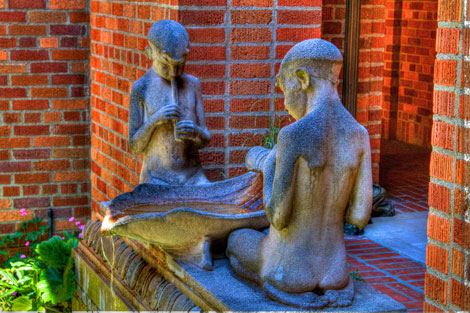A serial journal of cogent reflections and irreverent insights on the social effects of capitalism and the roots of partisan politics. Pairing prose with HDR photography and “flash points” drawn from current and historical perspectives, the author seeks to recover lost wisdom and courageous action beyond the shouting and noise of today’s headlines.
Chapter One:
Eight-Leaved Clovers of the World, Unite
London, 1847
 n a bleak November day, two men trudged along Great Windmill Street in London. They breathed in air yellow from industrial waste and pondered the extremes of wealth and poverty that had sprung up like gods and demons across the city landscape. Between their poor vision and the London fog, they could barely see a foot ahead of themselves, but in their minds’ eye, they saw a future of increasing economic division. Somewhere not too distant in time, they believed, anger would well up among the workers, culminating in revolutionary action.
n a bleak November day, two men trudged along Great Windmill Street in London. They breathed in air yellow from industrial waste and pondered the extremes of wealth and poverty that had sprung up like gods and demons across the city landscape. Between their poor vision and the London fog, they could barely see a foot ahead of themselves, but in their minds’ eye, they saw a future of increasing economic division. Somewhere not too distant in time, they believed, anger would well up among the workers, culminating in revolutionary action.
One of them wanted to show the world with a simple parable, like an ancient prophet, why society’s self-destruction was inevitable. The other, the son of a Jewish family that adopted Christianity, was someone born into affluence and respectability, but called to forsake his relations, though not so much that he wasn’t willing to borrow money from them. So it was that these two compatriots, Friedrich Engels and Karl Marx, made their way to the Red Lion Pub.


FLASH POINT
New York City, 1890
“These are the economic conditions that enable my manufacturing friend to boast that New York can “beat the world” on cheap clothing. In support of his claim he told me that a single Bowery firm last year sold fifteen thousand suits at $1.95 that averaged in cost $1.12 ½.”
~ From How the Other Half Lives, written by Jacob Riis
It was as if the two of them were destined to emerge victorious among a ragtag group of immigrants, intellectuals, utopians, anarchists, and protesters who had come together to chart a new social contract. Marx, full of himself, was never more alive than in a good intellectual battle, and Engels had the cheerfulness, adaptability, and good nature of a born organizer. “This time we will have our way,” he wrote to Marx before they arrived in London. And have their way, they did. The German Workers’ Educational Union, a convenient public relations front for the Communist League, voted to adopt their draft of the Communist Manifesto, which Marx had read portions of out loud to the group. However, what the group heard was in some doubt, given Marx’s accent and lisp. One witness recalled that when Marx said “workers,” some thought he said “eight-leaved clovers,” which must have been somewhat confusing.
Marx and Engels were early practitioners of a particularly speculative and ambiguous field of social science initially described as “political economy” and later shortened to “economics,” denoting a more neutral and quantitative perspective regarding society’s production and distribution of goods and services. Originally derived from an ancient Greek word, the root meaning of economics had to do with the management or administration of a household. But the household was now nations and transnational corporations.
Marx and Engels were visionaries, foreseeing a new economic institution that was still emerging, one that would harness the energies of human imagination in no less dramatic a fashion than Prometheus’s giving fire to humanity. Engels, in particular, was awed by what was occurring around them. He was not alone marveling at the extraordinary gifts of commerce, high culture, diversity, social mobility, new services, and hope that this new economic institution engendered. Capitalism was a dream for many of an ever-lasting prosperity. Marx and Engels sought to waken them to its true consequences.
In mid-19th-century London, the physical location where Marx and Engels delivered the Manifesto, their parable on social disintegration, there was no greater center of commerce in the world. It was a marketplace without comparison, a hive of activity where “at a low cost and with the least trouble, conveniences, comforts, and amenities beyond the compass of the richest and most powerful monarchs” could be found. Incomes were, on average, 40% higher there than in other English cities, and the results were palpable, with a level of escalating consumer demand driving entrepreneurial forces toward novelty, innovation, new technologies, and entire new industries.
These new economic arrangements were a thunderbolt challenging hundreds if not thousands of years of human history. Commerce of this proportion was a social retort to common beliefs about the inescapability of material deprivation for the masses. Capitalism was to be a buffering institution between the transcendent and random forces of God and nature on the one hand and control over one’s own personal destiny on the other. Trade of this form and intensity was a force for progress, freedom, and increasing liberty. What could go wrong?
The question hovers over us today as it did for Marx and Engels. They were witnesses to an emerging economic institution that still had no agreed-upon name. In the Communist Manifesto, they were more prone to talk about a bourgeoisie class than a capitalist class, but over the next 20 years, Marx would settle on words and terms like capitalist and capitalist mode of production, using them thousands of times in his economic discourses. But just as “eight-leaved clovers” had been mistaken for “workers,” audiences would hear different things, make wildly different judgments about their meaning and effects, and in the end polarize the choices between capitalism and communism, missing the collective context and dreams that had brought these words to consciousness in the first place.
Main Sources
The Worldly Philosophers, by Robert L. Heilbroner
The Communist Manifesto, by Karl Marx and Friedrich Engels
Grand Pursuit, by Sylvia Nasar
Next Week: The Calculus of Capitalism
What Marx provided was a theoretical blueprint for cracks that lay in the foundation of a new economic edifice called capitalism. And he did it in the way many intuitive but slightly skewed geniuses operate: by masking it in endless obsessive formulations that make one cry uncle and then demanding that no one deviate from its precepts. Clever…



0 Comments